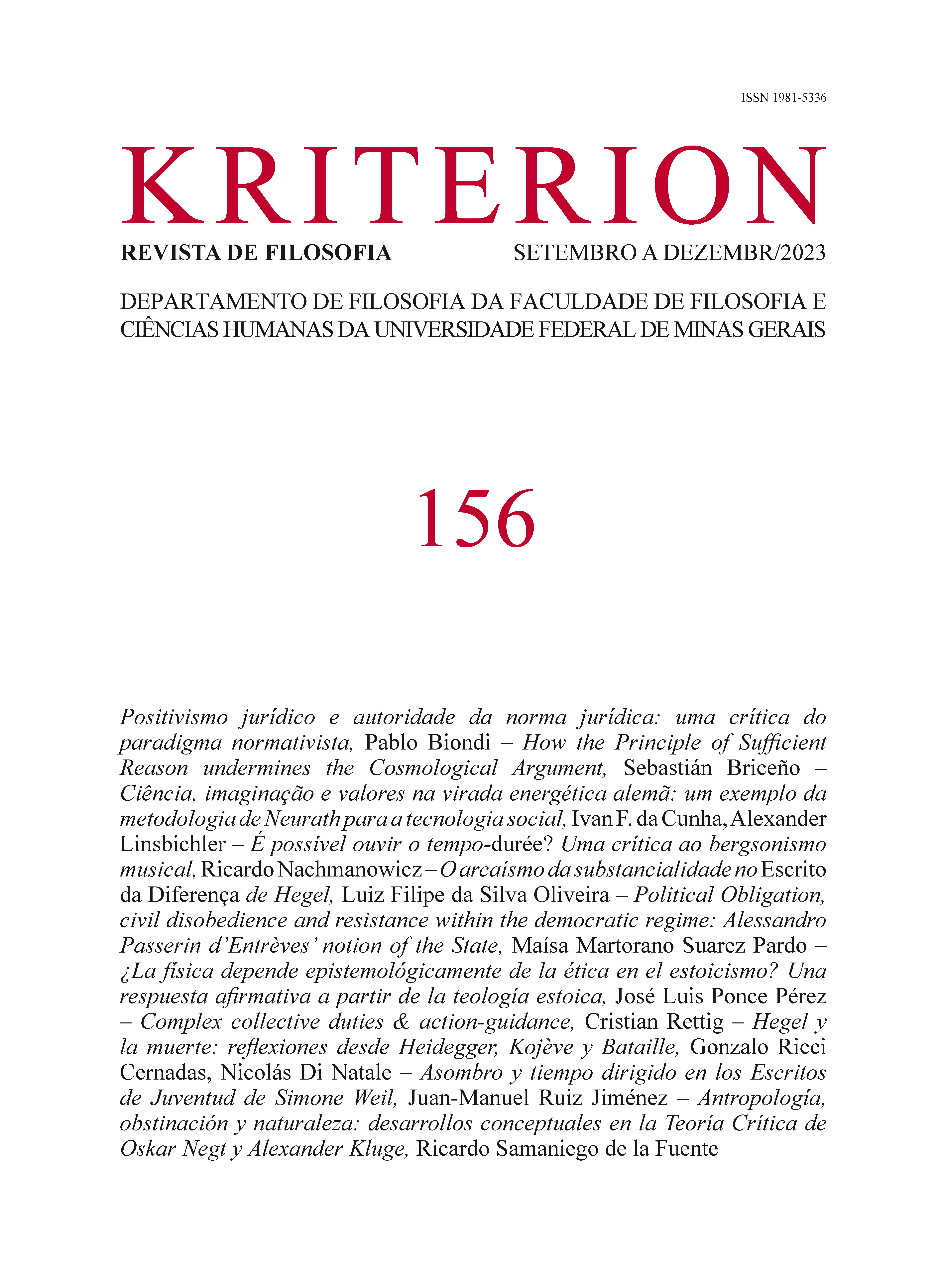ASOMBRO Y TIEMPO DIRIGIDO EN LOS ESCRITOS DE JUVENTUD DE SIMONE WEIL
Palavras-chave:
Simone Weil, Asombro, Tiempo dirigido, Cambio, MediaciónResumo
En este artículo analizamos la tentativa que realizó la joven
Simone Weil por pensar el tiempo y el cambio, y por descifrar la participación
que el mundo y la mente puedan tener en su configuración. Para lograrlo, nos
propusimos elucidar dos conceptos que creemos sintetizan su acercamiento: el
primero es el del asombro, entendido tanto en su calidad de intuición incesante
que revela la impotencia humana para comprender el presente, como en su
calidad de instancia mediadora entre ignorancia y ciencia humana aproximativa
del ámbito fenoménico. El segundo concepto que analizamos es el de tiempo
dirigido, significativo de la primera filosofía weiliana por cuanto patentiza la
subyugación del hombre al presente, único tiempo tangible. Determinación que
permite entender el sentido del pasado como existencia abolida, y el futuro
como núcleo virtual de posibilidades hacia el cual el ser humano prepara su
acción y trabajo gracias a su facultad para idear proyectos. En fin, en este
artículo tratamos de evidenciar la tensión problemática que discernía la joven Weil entre la ley de la inmediatez del mundo y la ley del tiempo que impone
pasos intermedios a la realización de toda actividad humana.
Referências
BAKER, T. “Praying to an absent God: the poetic revealing of Simone Weil”. Culture, theory and critique, 47:2, 2006, pp. 133-147.
BRISSON, L. “Le travail de Simone Weil sur le Timée de Platon”. Cahiers Simone Weil, 36, 3, 2013, pp. 233-248.
CAMPOS, M. “La idea del amor en el pensamiento de Simone Weil”. Protrepsis Revista de Filosofía, 22, mayo-octubre 2022 [Online]. Disponible en http://protrepsis.cucsh.udg.mx/index.php/prot/article/view/343.
CASPER, B. Le temps sauvé. Cahiers Simone Weil, 8, 3 (Simone Weil et le problème du temps), pp. 240-252, 1985.
CASTEL-BOUCHOUCHI, A. “Le platonisme achevé de Simone Weil”. Les Études philosophiques, 2007/3, 82, 2007, pp. 169-182.
CHENAVIER, R. “Les méditations cartésiennes de Simone Weil”. Les Études philosophiques, 2007/3, 82, 2007, pp. 183-205.
______. “Simone Weil, une philosophie du travail”. Paris: Cerf, 2001.
DAVID, P. “L’absolu peut-il faire l’objet d’une science expérimentale?” Cahiers Simone Weil, 35, 1, 2012, pp. 29-88.
DREYFUS, D. “Connaissance surnaturelle et obéissance chez Simone Weil”. Les Études philosophiques, 6e année, Nr. 4, 1951, pp. 276-288.
FUENTES-MARCEL, A. “Simone Weil pensadora liminar”. Daimon. Revista Internacional de Filosofía, 86, 2002, pp. 179-190.
GABELLIERI, E. “Être et don. S. Weil et la philosophie”. Louvain/Paris: Ed. Peeters, 2003.
HEIFETZ, A. “On sublimation and the erotic experience: Simone Weil and Hans Loewald”. Psychoanalytic Psychology, 34, 3, 2017, pp. 346-351.
KAHN, G. “La dialéctique du temps chez Simone Weil”. Cahiers Simone Weil, 8, 3, 1985, pp. 221-239.
KÜHN, R. “Unidad reflexiva y ontológica de lo real en Simone Weil”. Les Cahiers Simone Weil, 33, 4, 2010, pp. 511-542.
MÜLLER, W. “Simone Weil et la question de l’histoire du salut”. Cahiers Simone Weil, 24, 2, 2001, pp. 73-158.
PÉTREMENT, S. “La vie de Simone Weil”. Paris: Fayard, 1973.
RIVIALE, P. “La pensée libre. Essai sur les écrits politiques de Simone Weil”. París: L’Harmattan, 2004.
RUIZ JIMÉNEZ, J. “La presencia del mundo en los escritos de juventud de Simone Weil”. Filosofia Unisinos, 23, 1, 2022, doi: 10.4013/fsu.2022.231.07, pp. 1-13.
SCHLETTE, R. “Histoire des religions et théologie des religions chez Simone Weil”. Cahiers Simone Weil, 24, 2, 2001, pp. 73-158.
SCHLETTE, R., DEVAUX, A. (eds.). “Simone Weil : Philosophie, Religion, Politik”. Frankfurt: Josef Knecht Verlag, 1985.
VETÖ, M. “La métaphysique religieuse de Simone Weil”. París: L’Harmattan, 1997.
______. Kantische Themen im Denken der Simone Weil. In: Schlette, R., Devaux, A. (eds.), 1985, pp. 44-50.
VILLELA-PETIT, M. “Simone Weil et Edmund Husserl Convergences”. Les Cahiers Simone Weil, 23, 4, 2010, pp. 489-510.
VOGEL, C. La lecture comme réception et production de sens. Les enjeux de la pensée weilienne. Les Cahiers Simone Weil, 33, 2, 2010, pp. 201-213.
VORMS, M. “À l’épreuve du monde: l’éducation au sens large”. Les Études philosophiques, 2007/3, 82, 2007, pp. 155-167.
WEIL, S. “Cahiers II”. Paris: Plon, 1972.
______. “OEuvres complètes. Tome I: Premiers écrits”. Paris: Gallimard, 1988.
______. “OEuvres complètes. Tome IV, vol. 1: Écrits de Marseille (1940-1942)”. Paris: Gallimard, 2008.
______. “OEuvres”. Paris: Gallimard, 1999.
YODA, K. “An approach to Simone Weil’s Philosophy or education through the notion of reading”. Studies in Philosophy and Education, 36, 6, 2017, pp. 663-682.
Downloads
Publicado
Edição
Seção
Licença
Copyright (c) 2024 Revista Kriterion

Este trabalho está licenciado sob uma licença Creative Commons Attribution 4.0 International License.










